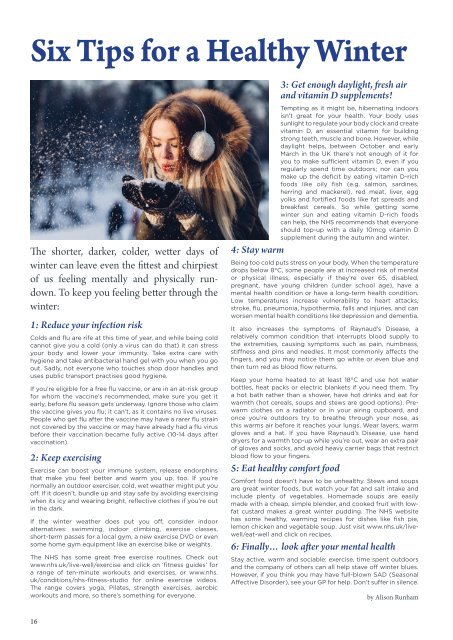I and A Mag Dec19
Create successful ePaper yourself
Turn your PDF publications into a flip-book with our unique Google optimized e-Paper software.
Six Tips for a Healthy Winter<br />
The shorter, darker, colder, wetter days of<br />
winter can leave even the fittest <strong>and</strong> chirpiest<br />
of us feeling mentally <strong>and</strong> physically rundown.<br />
To keep you feeling better through the<br />
winter:<br />
1: Reduce your infection risk<br />
Colds <strong>and</strong> flu are rife at this time of year, <strong>and</strong> while being cold<br />
cannot give you a cold (only a virus can do that) it can stress<br />
your body <strong>and</strong> lower your immunity. Take extra care with<br />
hygiene <strong>and</strong> take antibacterial h<strong>and</strong> gel with you when you go<br />
out. Sadly, not everyone who touches shop door h<strong>and</strong>les <strong>and</strong><br />
uses public transport practises good hygiene.<br />
If you’re eligible for a free flu vaccine, or are in an at-risk group<br />
for whom the vaccine’s recommended, make sure you get it<br />
early, before flu season gets underway. Ignore those who claim<br />
the vaccine gives you flu; it can’t, as it contains no live viruses.<br />
People who get flu after the vaccine may have a rarer flu strain<br />
not covered by the vaccine or may have already had a flu virus<br />
before their vaccination became fully active (10-14 days after<br />
vaccination).<br />
2: Keep exercising<br />
Exercise can boost your immune system, release endorphins<br />
that make you feel better <strong>and</strong> warm you up, too. If you’re<br />
normally an outdoor exerciser, cold, wet weather might put you<br />
off. If it doesn’t, bundle up <strong>and</strong> stay safe by avoiding exercising<br />
when its icy <strong>and</strong> wearing bright, reflective clothes if you’re out<br />
in the dark.<br />
If the winter weather does put you off, consider indoor<br />
alternatives: swimming, indoor climbing, exercise classes,<br />
short-term passes for a local gym, a new exercise DVD or even<br />
some home gym equipment like an exercise bike or weights.<br />
The NHS has some great free exercise routines. Check out<br />
www.nhs.uk/live-well/exercise <strong>and</strong> click on ‘fitness guides’ for<br />
a range of ten-minute workouts <strong>and</strong> exercises, or www.nhs.<br />
uk/conditions/nhs-fitness-studio for online exercise videos.<br />
The range covers yoga, Pilates, strength exercises, aerobic<br />
workouts <strong>and</strong> more, so there’s something for everyone.<br />
3: Get enough daylight, fresh air<br />
<strong>and</strong> vitamin D supplements!<br />
Tempting as it might be, hibernating indoors<br />
isn’t great for your health. Your body uses<br />
sunlight to regulate your body clock <strong>and</strong> create<br />
vitamin D, an essential vitamin for building<br />
strong teeth, muscle <strong>and</strong> bone. However, while<br />
daylight helps, between October <strong>and</strong> early<br />
March in the UK there’s not enough of it for<br />
you to make sufficient vitamin D, even if you<br />
regularly spend time outdoors; nor can you<br />
make up the deficit by eating vitamin D-rich<br />
foods like oily fish (e.g. salmon, sardines,<br />
herring <strong>and</strong> mackerel), red meat, liver, egg<br />
yolks <strong>and</strong> fortified foods like fat spreads <strong>and</strong><br />
breakfast cereals. So while getting some<br />
winter sun <strong>and</strong> eating vitamin D-rich foods<br />
can help, the NHS recommends that everyone<br />
should top-up with a daily 10mcg vitamin D<br />
supplement during the autumn <strong>and</strong> winter.<br />
4: Stay warm<br />
Being too cold puts stress on your body. When the temperature<br />
drops below 8°C, some people are at increased risk of mental<br />
or physical illness, especially if they’re over 65, disabled,<br />
pregnant, have young children (under school age), have a<br />
mental health condition or have a long-term health condition.<br />
Low temperatures increase vulnerability to heart attacks,<br />
stroke, flu, pneumonia, hypothermia, falls <strong>and</strong> injuries, <strong>and</strong> can<br />
worsen mental health conditions like depression <strong>and</strong> dementia.<br />
It also increases the symptoms of Raynaud’s Disease, a<br />
relatively common condition that interrupts blood supply to<br />
the extremities, causing symptoms such as pain, numbness,<br />
stiffness <strong>and</strong> pins <strong>and</strong> needles. It most commonly affects the<br />
fingers, <strong>and</strong> you may notice them go white or even blue <strong>and</strong><br />
then turn red as blood flow returns.<br />
Keep your home heated to at least 18°C <strong>and</strong> use hot water<br />
bottles, heat packs or electric blankets if you need them. Try<br />
a hot bath rather than a shower, have hot drinks <strong>and</strong> eat for<br />
warmth (hot cereals, soups <strong>and</strong> stews are good options). Prewarm<br />
clothes on a radiator or in your airing cupboard, <strong>and</strong><br />
once you’re outdoors try to breathe through your nose, as<br />
this warms air before it reaches your lungs. Wear layers, warm<br />
gloves <strong>and</strong> a hat. If you have Raynaud’s Disease, use h<strong>and</strong><br />
dryers for a warmth top-up while you’re out, wear an extra pair<br />
of gloves <strong>and</strong> socks, <strong>and</strong> avoid heavy carrier bags that restrict<br />
blood flow to your fingers.<br />
5: Eat healthy comfort food<br />
Comfort food doesn’t have to be unhealthy. Stews <strong>and</strong> soups<br />
are great winter foods, but watch your fat <strong>and</strong> salt intake <strong>and</strong><br />
include plenty of vegetables. Homemade soups are easily<br />
made with a cheap, simple blender, <strong>and</strong> cooked fruit with lowfat<br />
custard makes a great winter pudding. The NHS website<br />
has some healthy, warming recipes for dishes like fish pie,<br />
lemon chicken <strong>and</strong> vegetable soup. Just visit www.nhs.uk/livewell/eat-well<br />
<strong>and</strong> click on recipes.<br />
6: Finally… look after your mental health<br />
Stay active, warm <strong>and</strong> sociable: exercise, time spent outdoors<br />
<strong>and</strong> the company of others can all help stave off winter blues.<br />
However, if you think you may have full-blown SAD (Seasonal<br />
Affective Disorder), see your GP for help. Don’t suffer in silence.<br />
by Alison Runham<br />
16










